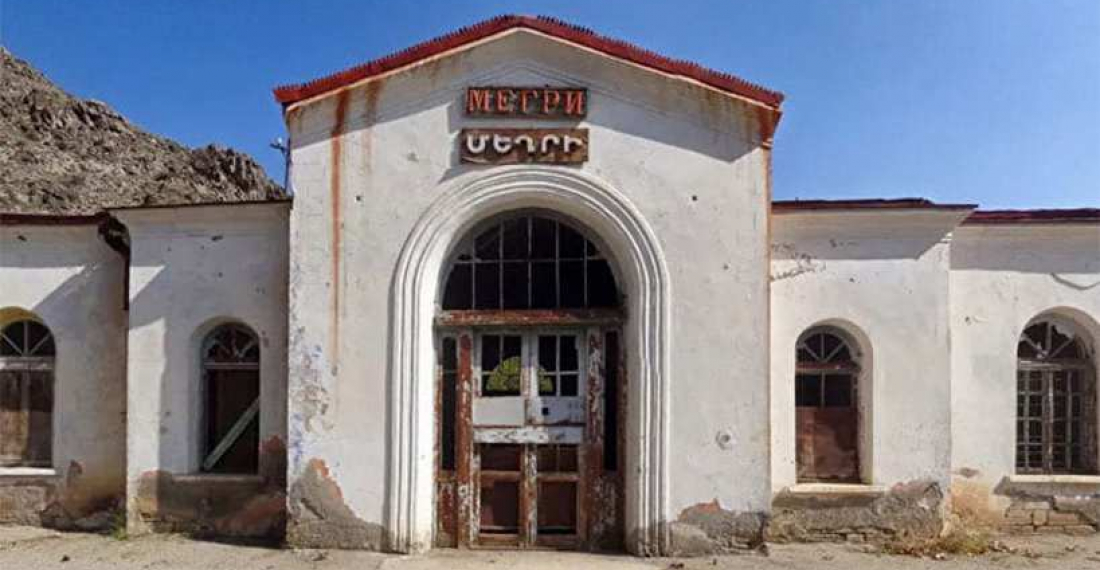At the recent face-to-face meetings of Azerbaijani President Ilham Aliyev and Armenian Prime Minister Nikol Pashinyan in Sochi and Brussels at the end of 2021, the two leaders agreed to restore the Soviet-era Yeraskh-Julfa-Meghri-Horadiz railway connection between the two countries, which has not been in operation for three decades. However, the major expectations regarding the border delimitation/demarcation process and opening of Nakhchivan corridor remained unresolved.
The last round of negotiations in Sochi was arranged in the light of deadly border skirmishes which left 13 soldiers killed on each side. While both leaders "agreed to take tangible steps for further de-escalation in the border area," the agreement on the railway connection between Baku and Yerevan was again reaffirmed during the Brussels meeting hosted by European Council President Charles Michel on December 14. The initial agreement on the railway connection raised optimism in Baku and Yerevan regarding the further mutual constructive dialogue and cooperation, though in Armenia, the opposition harshly criticised Pashinyan’s decision to re-launch the railway connection with Azerbaijan without additional guarantees.
Following on from this prime minister Nikol Pashinyan established a working group to assess the project's prospects and prepare for restoring the Soviet-era railway. The group is chaired by a former Armenian ambassador to Iran and current Pashinyan advisor Artashes Tumanyan. The railway connection was built back in 1941, linking Moscow with not only Azerbaijan, Armenia, and Nakhchivan, but with the Iranian rail network as well via Julfa in Nakhchivan. Despite its strategic importance , and its use over many decades, the railway became inoperable after 1989 when hostilities between Azerbaijan and Armenia ramped-up.
From the Azerbaijani perspective, the re-launching of the railway connection is another crucial step in fostering regional trade. Azerbaijan began construction on its side of the border shortly after the war, in February 2021, as part of the ceasefire deal ending the fighting. Since the end of the war, Baku has been avidly working on restoring regional communication lines and putting pressure on Armenia to cooperate by issuing harsh statements.
After months of exchange of bellicose statements, Yerevan and Baku have now settled down to discussing the details of restoring the railway connection.
The Armenian side stressed that it would operate the railway in compliance with international customs and border norms, and that the parts of the railway on each country's territory would be under the sovereign jurisdiction of the respective authorities. This condition is particularly important for the Pashinyan government to debunk all claims and criticism that "the railway will be functioning under Azerbaijan's terms." From a strategic point of view, with this railway connection, Armenia will receive a new connection line with Russia and Iran that has not existed since the demise of the Soviet Union. Hence, official Yerevan is confident that this renewed railway connection will facilitate the country's trade relations with its partner countries and have a positive impact on the internal political and economic situation . However, Pashinyan’s opponents are skeptical because of concerns about security issues. Despite this, according to Deputy Prime Minister, Mher Grigorian, the Armenian government is expected to start the process by restoring 45 km of the Yeraskh-Julfa-Ordubad-Meghri-Horadiz section of the railway, for which it will spend about $200 million.
From the Azerbaijani side, neither the information on the completion date nor the project's cost has not been disclosed yet, though many analysts believe that rebuilding should require little heavy-earth moving. Azerbaijan is particularly keen on unblocking the regional communication lines, and therefore, it should not come as a surprise that one of the consequences of the Sochi meeting entailed the restoration of the old railway connection, especially considering the fact that Moscow is also keen on the new transit link with its long-time ally Armenia.
As for Armenia, it is vitally important now to have a link with Russia and particularly Iran, a long-time supporter of Armenia. Furthermore, amid the normalization process between Turkey and Armenia, prime minister Nikol Pashinyan is confident that the railway will be a game-changer in negotiations with Ankara, given there is a possibility of reopening the Turkey-Armenian border, a further railway connection to Kars city via Gyumri is also possible.
Obviously, the renewed railway connection promises more dividends rather than just economic. The reopening of the railway connection contributes to a sustainable dialogue between Baku , Yerevan, and other regional states But the challenge to build mutual confidence is yet to be overcome, and this is necessary to eliminate risks of further escalations in the border area. However, if further dialogue can ensue, coordination and cooperation between regional states, as well as multilateral trade, would quickly see rapid growth.
source: This op-ed was prepared for KarabakhSpace.eu by Fuad Shahbazov, an independent analyst. @fuadshahbazov
Photo: A train station in Meghri had fallen into disrepair afternot having been used for more than thirty years
The views expressed in interviews, opinion pieces and commentaries do not necessarily reflect the position of KarabakhSpace.eu or its partners



